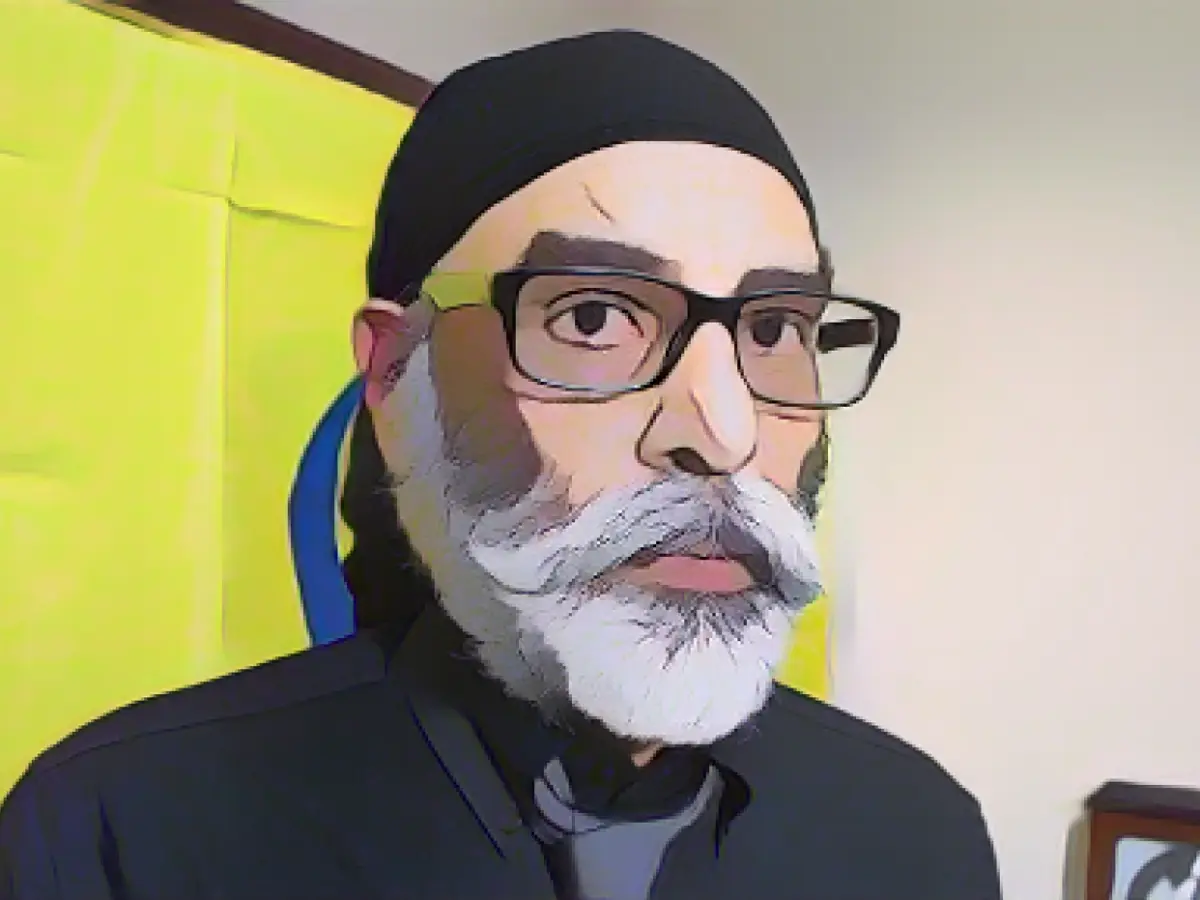FBI director in India over assassination accusations
Just two weeks ago, the United States accused an Indian government official of being involved in a plot to assassinate an American citizen in New York City.
The target of the alleged hit was Sikh separatist Gurpatwant Singh Pannun, who was accused of being behind a conspiracy to kill him.
Pannun is wanted in India and is considered a terrorist and a threat to national security by the Indian government. However, he is viewed as a vocal activist and champion of Sikh unity with the global Sikh diaspora by some in the Sikh community abroad.
Last month, the US Department of Justice charged an Indian citizen with attempting to assassinate Pannun, according to a scathing indictment that stated the assassination attempt was carried out on the orders of an unnamed Indian government official.
This revelation comes over a month after Canadian Prime Minister Justin Trudeau suggested that India may have been involved in the murder of another Sikh separatist, Hardeep Singh Nijjar, in India. The allegation led to a diplomatic spat between the two countries, with India vehemently denying any involvement in Nijjar's murder.
The assassination plot was thwarted, and the details of the indictment will need to be argued in court.
The scandal casts a shadow over the credibility of New Delhi, writes Suhasini Haider, foreign policy editor of The Hindu, in her latest op-ed.
There are concerns about the damage to US-India relations.
Despite denying any involvement in the alleged assassination plot, the Indian government has set up a high-level committee to investigate the allegations in the US indictment.
"In this case, which involves a US citizen and an alleged Indian official, it is a cause for concern," said the Indian foreign ministry in a statement.
Pannu has campaigned for an independent Sikh homeland, known as Khalistan, which covers parts of India's Punjab state.
Khalistan has been banned in India since the 1980s, and the painful memories of a bloody uprising by Sikh separatists in the 1980s still linger among many Indians. However, in the Sikh diaspora abroad, where Pannu can freely advocate for secession, the cause has gained some sympathy.
The issue is highly charged. Forty years ago, Indira Gandhi, the former Indian prime minister, was assassinated by Sikh bodyguards following the storming of the Golden Temple in Amritsar. The operation, known as Blue Star, resulted in widespread destruction and the deaths of hundreds of people, including Sikhs.

According to official estimates, the violence that erupted a few days after Gandhi's assassination and resulted in the deaths of around 3,000 people, mainly Sikhs, was one of the worst outbreaks of communal violence since India's partition.
Since the banning of the Khalistan movement by the government, the supporters of the movement in Punjab have been in the minority. Analysts believe that the extremism associated with the movement is not a significant threat to the country.
However, some Sikh organizations abroad, which advocate for reconciliation, continue to call for the partition of Punjab and accuse the Indian government of suppressing the Khalistan movement with terrorism charges.
The Indian government's response to such activists has been strong, particularly under the current prime minister, Narendra Modi.
"India went through a very difficult phase of the Khalistan movement in the 1980s. It impacted the country's national security," said Harsh Pant, vice president of the Observer Research Foundation, a New Delhi-based think-tank. "So the Indian government takes such things very seriously."
The relationship has not deteriorated
Pannu is a close ally of Nijjar, who is also wanted in India in connection with terrorist activities.
Pannu is a fiery speaker who has made separatist remarks and a threat to India and its government. He is wanted by Indian authorities for more than a dozen terrorism-related charges and is accused of trying to radicalize his community to establish Khalistan.
In a viral video last month, Pannu warned Sikhs not to fly with Air India, claiming their lives were in danger. Indian media reported that Pannu had threatened to bomb an Air India flight.
Pannu told CNN that he was not surprised that the plot to kill him was foiled.
"India has officially announced rewards for carrying out my global campaign for the Khalistan referendum," he said, referring to the polls that the Sikh diaspora conducted in support of a separate homeland.
Regarding the accusation that he and his supporters pose a threat to India, Pannu told CNN, "I have certainly challenged the territorial integrity of India, but it is only through ballots and not bullets, and hence it is not considered a terrorist act as per UN and international law."
Regarding his comments about Air India, he said that Indian media often distorts his statements.
"My video message said 'boycott' Air India, not 'bomb'," he said. "This is a disinformation campaign by the Modi government in India to equate peaceful boycotts with terrorism."
Analysts believe that Pannu's inflammatory rhetoric and media coverage of him could spark a backlash and trigger a reaction from the Indian government.
"If someone keeps making such statements and they are propagated in the media, it goes beyond the realm of diplomacy," said Pant. "Many people in India will wonder why the US government is tolerating such behavior. Public perception of the threat may be much greater than the actual threat itself."
The Indian establishment is divided over Pannu and his activities. Some believe that he poses a real threat, while others believe that he is being exaggerated.
"India has gone through a difficult phase of Khalistanism in the 1980s, and it impacted the country's national security," said Pant. "So the Indian government takes such things very seriously."
The relationship has not suffered significantly, but analysts believe that Pannu and his activities could further strain relations between the two countries.
The allegation of Indian government involvement in the assassination plot could have significant consequences and could damage the growing economic, technological, and military ties between the two countries.
However, analysts believe that the risk of more significant consequences is low, as both countries are determined to counter the growing influence of China in the region.
"I think the US and India have a mutual interest in countering China, and this issue will be addressed without compromising on their mission," said Daniel S. Markey, senior advisor for South Asia at the American Institute for Research. Peace and Security.
"They will address this issue, without, however, departing from their mission," he added.
In the past, similar situations have led to a compromise between the two countries, according to Markey.
"The murder of Jamal Khashoggi, a Saudi columnist for the Washington Post who criticized the Saudi government, caused international outrage and US condemnation," he said.
However, relations between the US and Saudi Arabia have since stabilized.
"A US official announced a visit by the FBI director to India," said the Indian Central Bureau of Investigation, the country's equivalent to the FBI, in a statement announcing Rai's visit. "This is a step towards deepening cooperation and joint efforts to combat all forms of crime in the spirit of international police cooperation."
In the statement, the CBI did not mention the US indictment.
"Reputational costs"
For some, the subdued response from the US and India suggests that senior Indian officials were not aware of the assassination plot.
"I find it hard to believe that it goes up to the top," said Pant. "Especially when you consider the cost involved. If people believe that it is a nefarious element, the question arises of who lost control."
In the US indictment, it is alleged that Nikhil Gupta, 52, worked with an unnamed Indian official to organize a meeting with a covert FBI agent whom he believed was a hitman for Pannu. The Indian official reportedly agreed to pay the FBI agent $100,000 for the murder.
However, the supposed hitman was, in fact, an undercover DEA agent, and Gupta was arrested in the Czech Republic in June 2023 at the request of US authorities.
At least in India, the scandal has not harmed the reputation of the government.
"A hardline faction could even be proud of this incident, considering it a demonstration of India's strength and a deterrent for other critics of the Indian state abroad," said Markey of the American Independent Party.
Pant said that there was a "fringe group" that supported the alleged assassination plot, but he believed that the Indian government "understood the complexity of the case."
"The US reacted very quickly and set up a commission to investigate," he added. "Because I think the consequences could be quite serious."
Markey, however, said that professional intelligence agents in India would "pay a high price for their reputation" if the alleged Indian government connections to the plot were proven true.
"Indian diplomats, particularly in Washington and Ottawa, will have to manage the situation," he said.

Also check out:
Source:
Enrichment Data:
The current investigation into the accusations that an Indian government official was involved in a plot to assassinate an American citizen, specifically Gurpatwant Singh Pannun, is as follows:
- US Surveillance and Indictment: The US government has been actively surveilling an Indian "senior field officer" (CC-1) and an associate, Nikhil Gupta, who were allegedly involved in the plot to assassinate Pannun. The surveillance led to the arrest of Nikhil Gupta in the Czech Republic in June 2023 at the request of US authorities. Gupta has been charged with murder-for-hire and conspiracy to commit murder-for-hire in a New York court[2].
- Indian Inquiry Committee: An Indian inquiry committee has been constituted to investigate the allegations. The committee has recommended legal action against an individual with known criminal ties, although the person's identity has not been disclosed. The committee worked in full cooperation with US authorities and assured swift action[3].
- US-India Relations: The allegations have strained US-India relations, with the US government expressing concerns over India's involvement in such plots. Tulsi Gabbard, in her confirmation hearing for the position of Director of National Intelligence, emphasized the gravity of these allegations and the need for thorough investigation[4].
- Current Developments: The US Justice Department has detailed the plot, including how CC-1 recruited Gupta to orchestrate the assassination and how they arranged for an advance payment to a DEA undercover officer posing as a hitman. The case is ongoing, with Gupta facing serious charges[2].
In summary, the investigation is ongoing, with significant evidence collected by US authorities, and legal actions are being pursued against those implicated in the plot. The incident has also led to a diplomatic strain between the US and India.







